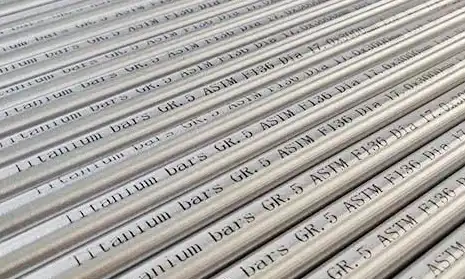As a new type of alloy and carrier material, titanium alloy is widely used in limb implants, alternative functional materials, dentistry, medical devices, and other fields. Titanium and titanium alloys have the characteristics of good corrosion resistance, high specific strength, low elastic modulus, fatigue resistance, and good biocompatibility. Among them, good biocompatibility gives it unique advantages over other metals, so titanium alloys are widely favored in the medical field, but due to its low wear resistance and process performance, efforts to further improve it are also ongoing.

Medical Titanium
1. The advantages of titanium and titanium alloys as implant repair materials are mainly:
① High strength, good chemical stability, and biocompatibility; ② Non-toxic, no harm to the human body; ③ Low elastic modulus, more compatible with human bones; ④ Memory alloy has elasticity and shape recovery function. In summary, the application of titanium in skull repair is mainly reflected in the use of titanium mesh can repair a defective skull. The application in human cardiovascular is reflected in the preparation of artificial heart valves, blood filters, pacemakers artificial heart pumps, etc.
2. The benefits of using medical titanium alloys for medical devices are:
① The devices are lightweight, which can reduce damage to blood vessels, muscles, and organs during surgery, reduce doctors' fatigue, and medical titanium devices are more suitable for delicate microsurgery; ② Good corrosion resistance and non-toxic, the equipment does not rust, the wound is not easy to get infected, and the wound heals quickly; ③ The elasticity of medical titanium alloys is moderate, suitable for making pliers, tweezers, microsurgeons, and other devices; ④ When operating under a shadowless lamp, the reflective performance of medical titanium is weak, which is more suitable than stainless steel;
3. Titanium medical devices mainly include:
Scalpels, surgical forceps, surgical tweezers, chest expanders, suture needles, sutures, etc. Medical titanium wire is used as surgical sutures. Compared with other materials (such as stainless steel wire), it has the advantages of small tissue reaction and good torsion resistance. After suturing, the surgical wound is not easy to get inflamed, and the bone suture site is not easy to shift. Sutures are generally made of medical titanium wire (TA1 or TA2 wire) with a diameter of 0.5~0.8mm. In addition, the soft elastic force generated by the titanium-nickel alloy wire can promote the rapid healing of wounds. Medical titanium alloy is also an important material for auxiliary rehabilitation equipment, such as wheelchairs, crutches, splints, medical instruments, etc.
4. The advantages of titanium as artificial bone:
Clinically, bone defects caused by trauma, tumors, and infections are very common. Autologous bone transplantation is a way to treat bone defects, but its source is limited and it is easy to cause complications in the bone donor area, increase operation time, and increase blood loss. Allogeneic bone has some advantages over autologous bone, but there is an immune rejection reaction and the possibility of infection. Artificial bone has a medical effect similar to autologous bone, including two major categories of products: artificial bone joints and bone repair materials.
Titanium bone is fixed with titanium sheets and titanium screws at the site of bone injury. After a few months, the bone will grow on the titanium sheet and in the thread of the screw. The new muscle is wrapped on the titanium sheet. This "titanium bone" is like a real bone. Titanium artificial bone can even be used to replace human bone to treat fractures. Titanium is corrosion-resistant and highly stable. Long-term contact with humans does not affect its essence and will not cause human allergies.
5. Application of Titanium in Dental Implants Why is titanium a popular material for medical and dental implants? In dentistry, commercially pure titanium, grade 4 [CP Ti] is the most common material. There are also titanium alloys used for medical implants. Currently, it is mainly titanium 64 alloy, which is the material of choice in the field of plastic surgery. Other titanium alloys are more esoteric, but they are not commercialized to a large extent.
Titanium is an oxygen absorber. It spontaneously forms a protective oxide layer on its surface, which makes the bulk material more corrosion-resistant than bare metal. The average internal temperature of the human body is 37 degrees Celsius, similar to seawater because it contains various potentially corrosive elements. Titanium can withstand this harsh environment. In addition to being highly corrosion-resistant, titanium and its alloys can bond tightly to bones. This property improves the long-term performance of implants and reduces the risk of loosening and failure.
Conclusion: The above is a complete summary of the application of titanium alloys in the medical field. If you have any related needs, please feel free to contact us. Email:linhui@lhtitanium.com











